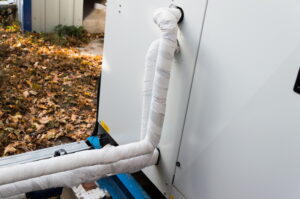 When your air conditioner stops cooling your home efficiently, you might suspect it’s run out of refrigerant. This chemical substance is responsible for cooling heat from warm air before it’s sent into your home.
When your air conditioner stops cooling your home efficiently, you might suspect it’s run out of refrigerant. This chemical substance is responsible for cooling heat from warm air before it’s sent into your home.
But it turns out that most people’s idea of refrigerant isn’t actually true! The biggest myth about refrigerant is that it “runs out” from normal use.
Air conditioning systems are manufactured with enough refrigerant to last their entire lifespan. That can be up to 10 or 15 years!
So, if you suspect that refrigerant has vanished from your unit, chances are you’re dealing with something else instead: a leak.
What Is Refrigerant in Air Conditioning?
Air conditioners use a chemical called refrigerant to cool air that passes over your system’s evaporator coils. Models made before 2010 used a chemical called freon, but due to negative environmental impacts, it was discontinued completely in 2021. All models made after 2010 use the safer refrigerant, R410A, or Puron.
Most older systems that have been regularly maintained now also use Puron. Freon is only considered a threat today if it isn’t disposed of properly.
All HVAC technicians with a valid license must undergo specialized training to ensure they safely handle refrigerants without jeopardizing the environment or people’s health.
No matter the type, ACs process all refrigerants the same way. Evaporator coils turn the liquid refrigerant into a gas, which creates a cool area for warm air to pass through. This is the “cooling” part of a typical AC cycle.
The heat captured by the evaporator coils is turned back into liquid refrigerant when it moves over to the condenser coils. Once it’s been converted back into liquid form, it releases the heat it captured when it was in the evaporator coils.
Hot air is blown back outside, and the cycle starts again. But what happens when there’s a leak in your air conditioner?
Signs You Have a Refrigerant Leak
You may need professional AC repair if you notice any of these signs:
- Higher energy bills without changes in usage habits.
- AC takes longer to cool your home.
- Increased indoor humidity levels.
- Poor airflow.
- AC noticeably leaking water.
- Warm air blowing out of the vents.
A refrigerant leak not only decreases your system’s performance. It puts additional strain on your air conditioner, which can cause other parts of the system to break down as well.
Getting to the root of the issue is crucial to ensuring you don’t go without cooling or face major repair costs.
Causes of Refrigerant Leak in Air Conditioners
For units that are between 4 and 7-years-old, most leaks are caused by the tube that houses the liquid refrigerant. However, leaks can also occur at multiple connection points throughout a system, which is why consulting a professional technician for an inspection is vital in fixing the issue.
The pipes in your AC are made of copper, which isn’t prone to corrosion. However, it can still wear down if it’s exposed to formaldehyde. Now, don’t panic. This is actually a highly common indoor air pollutant.
Formaldehyde can become a substance called formic acid when it’s drawn into your vents and passes through AC coils. This acid can then lead to a process called formicary corrosion, which may create leaks and openings in pipes.
Fixing a refrigerant leak is imperative to your system’s performance — and your energy bill.
For professional air conditioning service in St. Augustine and beyond, contact Climate Masters. Serving St. Johns County since 1988 with quality, hometown service.







